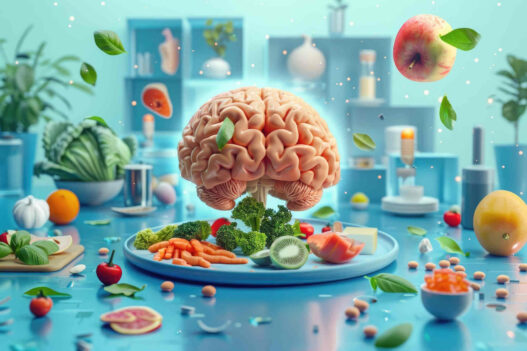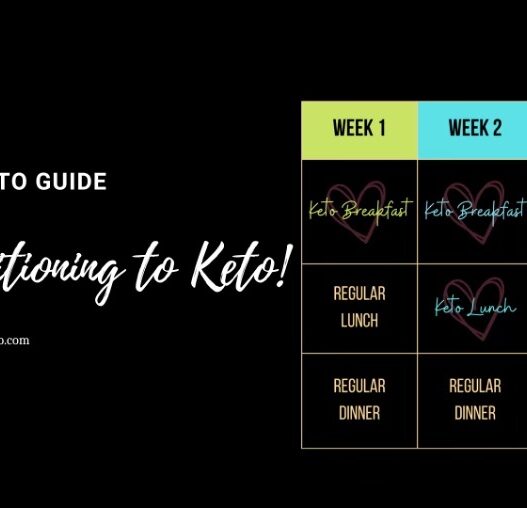Brain Health and Lifestyle
It’s brain awareness week! Living a healthy lifestyle is widely known to be important to support brain health. There is evidence that the brain has the ability to structurally and functionally adapt in response to behaviors and experiences that can affect cognitive function. We are not helplessly destined for problems due to genetics or the aging process. We have the ability to grow new neurons (i.e., neurogenesis), the ability to strengthen or weaken the amount and quality of our neuronal connections (i.e., neuroplasticity), and maintain brain integrity through our everyday actions throughout our life (1, 2).
This is important for human development or during recovery from injury or impairments, and also gives us a sense of empowerment throughout life as we age. Recent studies even suggest that we can reverse cognitive decline using a personalized, multi-factorial therapeutic approach (3). This is where many lifestyle intervention and related actions, including those represented by the four S-factors, can play a major role. In this article, you will learn more about the four lifestyle-related S-factors (i.e., sleep, stress, social connection, and spiritual health or the power of purpose) and their role in promoting brain health.
The need for worldwide attention to brain health is clear. In fact, the World Health Organization published a position paper on optimizing brain health across life in 2022 (4). Community-wide brain health has the ability to shape economic resilience based on the Brain Capital model (5).
Brain Capital has been defined as “knowledge, creative skills, and optimal brain health that people accumulate throughout their lives, enabling them to realize their potential as productive members of society.” This model includes sub-components of brain health, economy, and skills as well as elements of human, psychological, social, and cognitive capital. There is a recognized need to formalize a Brain Capital Index and to integrate Brain Capital into policy development in many areas including those targeted for specific populations, industries, services, or social determinants of health.
Potentially modifiable risk factors associated with dementia across the life course have been described. In a 2020 report by the Lancet Commission, defined risk factors include (i) less education, (ii) hypertension, (iii) hearing impairment, (iv) smoking, (v) obesity, (vi) depression, (vii) physical inactivity, (viii) diabetes, (ix) low social contact, (x) alcohol consumption, (xi) traumatic brain injury, and (xii) air pollution (6).
It is estimated that these factors account for around 40% of worldwide dementias. As many of these factors are associated with lifestyle behaviors, we have the ability to influence our brain health by reducing neuropathological damage as well as increasing and maintaining our cognitive reserve (i.e., associated with neurobiological brain capital including the number of neurons and synapses that can enable adaptability to preserve cognitive function in the face of brain pathology).
The WHO guidelines also lay out lifestyle intervention or the management of modifiable risk factors for dementia, which include (i) physical activity, (ii) tobacco cessation, (iii) nutrition, (iv) alcohol use, (v) cognitive interventions, (vi) social activity, (vii) weight management, (viii) hypertension, (ix) diabetes, (x) dyslipidemia, (xi) depression, and (xii) hearing loss (7).
A multi-factorial therapeutic approach program being developed at Apollo Health referred to as ReCODE (reverse cognitive decline) has 7 core strategies, with some overlap with those defined by the WHO and the Lancet Commission: (i) nutrition, (ii) physical exercise, (iii) sleep, (iv) stress, (v) brain stimulation, (vi) detoxification, and (vii) targeted supplementation (3).
I shared information about the importance of lifestyle intervention like nutrition and exercise on brain health in an earlier article on Healthieyoo. In this article, we will dive deeper into brain health lifestyle intervention and focus on what I refer to as the four S-factors: sleep, stress, social connections, and spiritual health. Although each is individually referenced as important, you will notice how they are interrelated, making it clear that the presence or lack of any one S-factor can impact the others in a positive or negative way.
There is an extensive amount of research-based information that supports the importance of these lifestyle-related S-factors for brain health. To accommodate different learning preferences, I have selected a variety of media, including scientific journals, books, web-based resources, and videos featuring distinguished thought leaders. This review is not meant to be comprehensive.
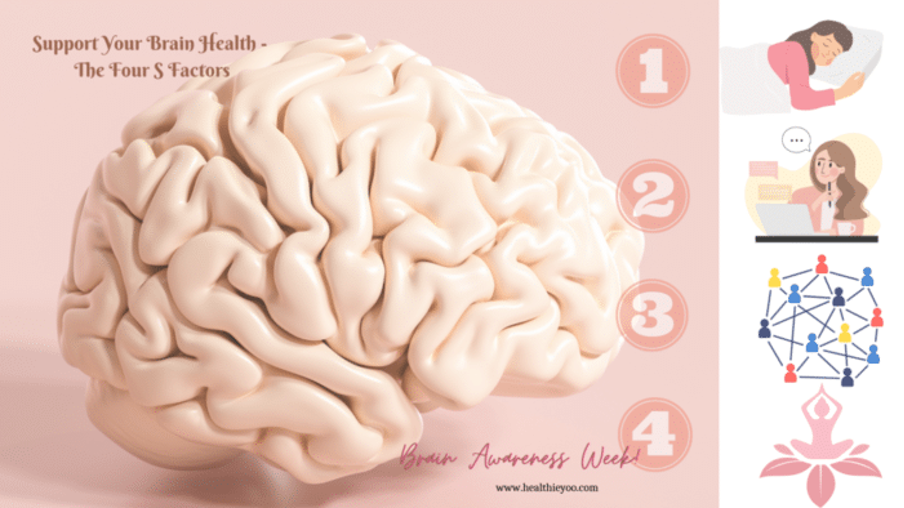
Sleep and Brain Health – The First Brain Awareness Week S-Factor
The first lifestyle intervention that I’m going to discuss this brain awareness week is sleep. The need to get sufficient sleep is well known, ranging from 7-18 hours a day varying with age, with more sleep needed for babies undergoing intense growth and development. It is important to remember to look beyond the number, as the quality of sleep is important as well.
Sleep has been shown to correlate with brain health through its role in supporting neurogenesis, neuroplasticity, and the removal of toxins or waste products that are generated when you are awake (8, 9, 10). Sleep is not a passive process, your body needs time to rest, repair, and remove waste. Sleep is an investment in your health and brain health that should be a day-to-day priority.
Sleep can be influenced by many lifestyle factors, including nutrition and exercise. In fact, a recent review summarizes how sleep, diet, and exercise can influence brain health and the ability of our brain to form new connections with structural or functional consequences in response to experience (i.e., neuroplasticity).
Pickersgill and coworkers (2022) summarize the evidence associated with the independent as well as combined benefits of exercise, diet, and sleep on brain health (11). Neuroplasticity was measured using neurophysiological data, molecular biomarkers, and cognitive assessments. Overall, a quality dietary pattern and eating practices as well as a combination of aerobic and resistance exercises and physical activity are found to correlate with better sleep and enhanced neuroplasticity and brain health.
Other factors that can influence sleep quality or quantity include stress, genetics, age, some medications, or some medical conditions (e.g., insomnia, sleep apnea, narcolepsy, restless legs syndrome, epilepsy) (8, 9, 10).
The sleeping environment can also have an impact, including many factors that can be controlled to enhance sleep. To best benefit from sleep, consider one or more of the following: (i) set a schedule with consistent sleep and wake times, (ii) set a welcoming sleep environment (e.g., dark, quiet, cool temperature, comfortable mattress), (iii) have a relaxing routine (e.g., reading, bath, soothing music, essential oils), (iv) limit activity, food, and some beverages (e.g., caffeine and alcohol) late in the day, (v) limit the use of bright electronics, (vi) don’t lie in bed awake and consider doing some relaxing activities, or (vii) consider technological aids (e.g., sleep tracker, smart mattress, app tracker/log) (8, 9, 10).
One thought leader in the field of sleep health is Dr. Michael Breus, Ph.D. (also known as the Sleep Doctor) (12). He is a Clinical Psychologist with a specialty in sleep disorders, an advocate for integrating lifestyle changes to improve sleep, as well as a best-selling author. He shares the science behind sleep and different ways to get better sleep in many books and videos. In one of his short videos, he shares 5 ways to improve your sleep, including having a consistent bedtime, watching when you enjoy caffeine or alcohol, getting sufficient exercise, and encouraging getting sunlight exposure in the morning to reset the circadian clock (12).
The Sleep Doctor has identified 4 sleep chronotypes (the body’s natural disposition to be awake or sleep at certain times, closely related to your circadian rhythm). The chronotypes include (i) fragmented pattern, (ii) early to bed/rise, (iii) rise and set with the sun, and (iv) late to bed/rise, otherwise identified as being a dolphin, lion, bear, or wolf. You can learn more about what your chronotype is using a quiz he has developed (12). Knowing your chronotype might help you discover what lifestyle or environmental changes could benefit your sleep and brain health.
Another thought leader on sleep is Matthew Walker, Ph.D., a professor at the Helen Wills Neuroscience Institute, the Founder and Director of UC Berkeley’s Center for Human Sleep Science, and the author of “Why We Sleep” (13). In this TED talk, he indicates that “… sleep, unfortunately, is not an optional lifestyle luxury… nonnegotiable biological necessity… your life support system” (13). Sleep supports brain health by enhancing learning and memory processes and the lack of sleep has been linked to dementia. He recommends a regular sleep schedule, a cool environment, and restricting the amount or timing of naps, caffeine, and alcohol.
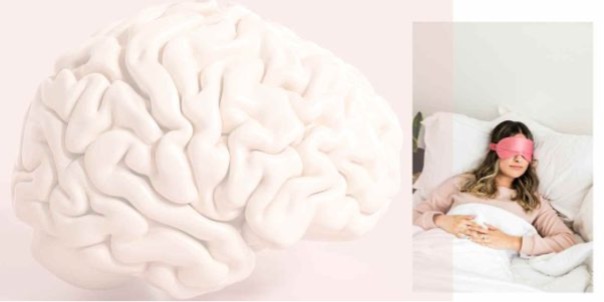
Stress and Brain Health – The Second Brain Awareness Week S-Factor
The second lifestyle intervention for brain health is stress. Our body is designed to encounter and react to stress in an effort to maintain homeostasis, a state of internal stability. Internal stress can be presented locally in a specific area of the body or systemically. Stress can be measured at the system, cellular, and even molecular level. Stress is often categorized into physiological and psychological components (i.e., emotional, cognitive, perceptual, psychosocial) (14).
The concept of what stress is defined as has evolved over time. A recent review describes a framework that consists of 3 types of stress: (i) sustress, (ii) eustress, and (iii) distress (i.e., inadequate, good, and bad stress respectively) (14). This framework illustrates the important benefits that having a sufficient level of challenge in the form of stress can have on the body, with too much or even too little leading to deleterious effects. In general, a stimulus results in the generation of stressors that may result in a state of stress that can threaten homeostasis.
There is a clear connection between stress and brain health. On this brain awareness week, I have chosen to share wisdom from 2 thought leaders that illustrate this complex connection between brain health and stress.
Dr. Ian Robertson, Ph.D., is a distinguished thought leader in the brain health field. He is the Founding Director of the Global Brain Health Institute at Trinity College Dublin (15). He transitioned to a career as a cognitive neuroscientist after practicing as a clinical psychologist for many years. He was inspired by the 1980s transition in thinking of the brain as one that is fixed or hard-wired to one that could change and be shaped by experience. He is the author of “The Stress Test. How pressure can make you stronger and sharper.” He shared the concepts in his TED talk “How Stress Makes Us Sharper” (15).
Dr. Robertson discusses the comprehensive nature of arousal associated with the sympathetic nervous system and how the context of when stress occurs is important as well as our mindset towards what the feelings mean (e.g., feeling a sense of threat or one of the challenges). He encourages all of us to embrace some discomfort and adversity while striving to find that optimal level of arousal for peak performance and positive emotional, physical, mental, and overall brain health benefits.
Stress often is associated with bad habits or addictions. Jud Brewer, MD, Ph.D. is a thought leader in habit change (16). He has many distinguished professional roles, including one as an Associate Professor in the Department of Behavioral and Social Sciences and one as the Director of Research and Innovation at the Mindfulness Center. both at the School of Public Health and Psychiatry at the Medical School at Brown University. He is the best-selling author of many books. He is a thought leader in how mindfulness training, and its underlying neural mechanisms, can help us to let go of old habits that adversely affect our well-being (e.g., smoking, stress eating, anxiety).

Social Connection and Brain Health – The Third Brain Awareness Week S-Factor
The third lifestyle intervention to discuss this brain awareness week is social connections. Living a life that involves quality social interactions combined with other healthy lifestyle factors has been shown to be good for brain health. Social connection can influence the maintenance of neuron integrity and function as well as provide protection from neurodegeneration or brain atrophy (17).
Overall, social interaction stimulates the brain, requiring effort and the use of skills that are essential for meaningful relationship development and maintenance. These interactions help to support cognition in a way that can prevent or delay cognitive decline and can also elevate mood in a way that supports emotional and brain health.
An interrelationship among social relationships, physical activity, and a sense of purpose has been shared in a perspective paper describing the connection as “motion, relation, and passion” (17). They review several mechanistic components that contribute to how these factors have been shown to support brain health, including those that have molecular, cellular, or systemic effects (e.g., gene expression, protein function, brain tissue genesis, and increased vascularization).
The association of social relationship quality and quantity with mental health, morbidity, and mortality has been demonstrated by many studies, as noted in a meta-analysis review (18). They compare 2 models for the health benefits of social relationships, the stress-buffering and main effect models. Relationships can buffer the effects of unhealthy stress through social support and resources. The main effect model focuses on more direct social effects on cognitive, emotional, behavioral, and biological influences, and even a sense of purpose in life.
The quality of relationships over our lifespan has been shown to protect our bodies and our brain. The Harvard Study of Adult Development (HSAD) is a longitudinal study that has followed individuals from their teenage years to old age, looking for clues about what keeps people happy and healthy. The study started in the 1930s when it enrolled over 700 men from both privileged and troubled backgrounds and compared aspects of their health and life over time.
The study continues to this day, including many generations of participants representing different ages and genders. Data has been collected through questionnaires, medical records, home interviews, or other forms of communication. Good, quality relationships, not wealth, fame, or working harder, seem to best correlate with better health and well-being. As the study continues, the discussion of meaning and purpose in life is part of the discussion (19).
Robert Waldinger, MD is a thought leader on living a good life (20). He is a Professor of Psychiatry at Harvard Medical School, a Physician Investigator at Mass General Research Institute, and a Psychiatrist at Massachusetts General Hospital. He is a co-author of a recently released book called “The Good Life: Lessons from the world’s longest scientific study of happiness.”
He shares the history of the HSAD (Harvard Study of Adult Development) study in a TED talk and his perspective on how important relationships are to our health, preventing the ill effects associated with loneliness and possibly protecting us from the deleterious effects of other stressors we encounter in our life (20).
He acknowledges the relationship challenge when he stated: “…close relationships are good for our health and well-being… relationships are messy and they’re complicated and the hard work of tending to family and friends… It’s lifelong. It never ends.” This lifestyle intervention or factor, i.e., social connection with family, friends, and community plays a clear role in being healthier, living longer, and being happier. The benefits include an apparent reduction in the risk of brain health and functional decline.
It is important to acknowledge this brain awareness week that social relationships are not limited to deep connections with single people over a long period of time. Barbara L. Fredrickson, Ph.D., a Psychology Professor and Director of the Positive Emotions and Psychophysiology Laboratory at the University of North Carolina at Chapel Hill and author, describes the importance of “micro-moments” in her TED talk (21).
The concept of micro-moments highlights the value of small, positive interactions that we have in our daily life, as she stated: “…as you have more of these micro-moments of connection in your daily life, it changes you. It changes you for the better. Not just socially and psychologically but also physically… your vagus-nerve functioning improves… increase your odds of living a long, happy and healthy life.” Interactions with others, no matter how big or small can have a lasting effect on our happiness, well-being, and brain health.

Spiritual Health and Brain Health – The Fourth Brain Awareness Week S-Factor
Spiritual health is a broad term that can encompass all dimensions of wellness and this is the fourth lifestyle intervention. In my four S-factor model, the focus of spiritual health is largely connected with a sense of purpose or higher meaning in life. Spiritual health is also often associated with practices such as prayer, mindfulness, meditation, or gratitude. Spiritual health is one of the six dimensions defined by the National Wellness Institute (NWI). (22).
Living a spiritual life, often defined as one driven by a sense of passion or higher purpose, has been shown to be good for brain health (17). When you live a life with a sense of purpose or meaning toward something you value, this naturally requires a growth mindset and grit that involves activities that engage someone in learning, taking on challenges, deliberate practice and repetition, and other things that help to develop and maintain functional neural networks.
Living with a sense of purpose, or spiritual health tends to enhance overall well-being, with a positive impact on other dimensions of wellness such as increased physical and social activities. Living a life with a sense of purpose has also been shown to be associated with a lower risk of psychological distress and loneliness according to a recent meta-analysis review (23).
The Center for Healthy Minds at the University of Wisconsin, Madison has developed a framework consisting of 4 Pillars of a Healthy Mind that includes a sense of purpose: (i) awareness; (ii) insight; (iii) connection; and (iv) purpose (24). The framework acknowledges the subjective view of well-being and the ability of training to enhance our brain health due to the magic of neuroplasticity.
The 4 pillars framework helps to support well-being. One can promote awareness by being mindful and limiting distractions. The pillar of insight encourages awareness of self-knowledge that can facilitate growth-orientated beliefs in the face of challenging circumstances. You can foster connection through supportive relationships. The best way to live with purpose or spiritual health is to have your daily activities be in alignment with your core values and view challenges as opportunities for growth.
Richard Leider is a well-known thought leader on the power of purpose (25). He has an impressive biography as an Executive Coach, the founder of Inventure – The Purpose Company, and as an international best-selling author of many books, including “The Power of Purpose: Find Meaning, Live Longer, Better”.
He shared his thoughts on how to unlock the power of purpose in a TED talk (25). He describes two fundamental moments for thriving, the day you were born and the day you determine why you were born (i.e., purpose). The purpose is a pill that can reduce ills including cognitive decline as well as add years to your life.
He encourages you to think about what your calling is by using the 1-minute “napkin test”. Your calling (C) is where your gifts (G), passions (P), and values (V) come together in a way that serves your sense of purpose (G + P + V = C). He closes the discussion by connecting purpose to others in your family or community. Let us live with a sense of purpose or spiritual health this brain awareness week as this is a powerful lifestyle intervention or factor to enhance your brain health.
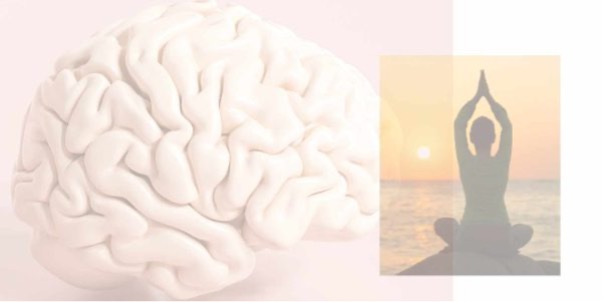
Final Thoughts
I challenge you to embrace brain health with a mindset of personal growth instead of mental decline.
The evidence is clear, healthy lifestyle behaviors can enhance and protect your body and brain health. Living a healthy lifestyle that includes nutrition that fuels your body with essential nutrients, routine physical activity that challenges your physical abilities, careful attention and mindfulness towards the four S-factors (i.e., sleep, stress, social, spiritual health) or lifestyle intervention, and much more will support your well-being and brain health in years to come.
The recognized importance of brain health is evident by the presence of many ongoing brain health research initiatives and continued funding support for long-term studies that will allow for the tracking of brain changes throughout life and the effects that any lifestyle intervention might have on brain health. Discussion of specific initiatives is beyond the scope of this review.
Sources
- National Institute of Neurological Disorders and Stroke Brain Basics: Know Your Brain. https://www.ninds.nih.gov/health-information/patient-caregiver-education/brain-basics-know-your-brain
- National Institute of Neurological Disorders and Stroke Brain Basics: The Life and Death of a Neuron. https://www.ninds.nih.gov/health-information/public-education/brain-basics/brain-basics-life-and-death-neuron
- Rao, R.V. et.al. 2021. ReCODE: A Personalized, Targeted, Multi-Factorial Therapeutic Program for Reversal of Cognitive Decline. Biomedicines, 9(10):1348. doi: 10.3390/biomedicines9101348
- Optimizing brain health across the life course: WHO position paper. Geneva: World Health Organization; 2022. https://www.who.int/publications/i/item/9789240054561
- Smith, E., et al. 2021. A Brain Capital Grand Strategy: toward economic reimagination. Mol Psychiatry, 26: 3–22. https://doi.org/10.1038/s41380-020-00918-w
- Livingston, G. et.al., 2020. Dementia prevention, intervention, and care: 2020 report of the Lancet Commission. Lancet, 396: 413-446. doi:1016/S0140-6736(20)30367-6
- Risk reduction of cognitive decline and dementia: WHO guidelines. 2019. https://www.who.int/publications/i/item/9789241550543
- National Institute of Neurological Disorders and Stroke Brain Basics: https://www.ninds.nih.gov/health-information/public-education/brain-basics/brain-basics-understanding-sleep?search-term=sleep
- National Heart, Lung, and Blood Institute: https://www.nhlbi.nih.gov/resources/your-guide-healthy-sleep
- National Sleep Foundation (NSF): https://www.thensf.org
- Pickersgill, J.W., et.al. 2022. The Combined Influences of Exercise, Diet and Sleep on Neuroplasticity. Frontiers in Psychology, 13: article 831819. doi: https://www.frontiersin.org/articles/10.3389/fpsyg.2022.831819/full
- Michael Breus, PhD (also known as the Sleep Doctor), Sleep thought leader
- Michael Breus Books: https://thesleepdoctor.com/books/
- Sleep Doctor – 5 steps to better sleep: https://youtu.be/vzRz7X0WfBA
- Sleep chronotype: https://thesleepdoctor.com/sleep-quizzes/chronotype-quiz/
- Matthew Walker, PhD, Sleep thought leader
- https://psychology.berkeley.edu/people/matthew-p-walker
- https://www.humansleepscience.com
- Sleep is your superpower | Matt Walker TED talk: https://www.youtube.com/watch?v=5MuIMqhT8DM
- Lu, S. Wei, F., and Li, G. The evolution of the concept of stress and the framework of the stress system. 2021. Cell Stress, Vol 5. No. 6.doi: 15698/cst2021.06.250
- Ian Robertson, PhD, Stress Thought Leader
- Ian Robertson, MPhil, PhD, FTCD | Global Brain Health Institute (gbhi.org)
- TED talk: How Stress Makes Us Sharper | Ian Robertson | TEDxTrinityCollegeDublin. https://youtu.be/RnJAtztON84
- Judson Brewer, MD, PhD, Stress Thought Leader
- Judson Brewer, MD, PhD | Mindfulness Center | Brown University
- A Simple way to break a bad habit | Judson Brewer: https://youtu.be/-moW9jvvMr4
- Sigmundsson, H, Dybendal, B.H., and Grassini, S. 2022. Motion, Relation, and Passion in Brain Physiological and Cognitive Aging. Brain Sciences, 12(9),1122. doi: https://www.mdpi.com/2076-3425/12/9/1122
- Holt-Lunstad, J., Smith, T.B., and Layton, J.B. Social relationships and mortality risk: a meta-analytic review. 2010. PLoS Medicine, 7(7), e1000316. doi: https://journals.plos.org/plosmedicine/article?id=10.1371/journal.pmed.1000316
- Harvard Study of Adult Development (HSAD): https://www.lifespanresearch.org/harvard-study/
- Robert Waldinger, Social Health thought leader
- https://researchers.mgh.harvard.edu/profile/519813/Robert-Waldinger
- TED talk: What makes a good life? Lessons from the longest study on happiness | Robert Waldinger. https://youtu.be/8KkKuTCFvzI
- Barbara Fredrickson, Social Health and positive psychology thought leader
- PEP Lab (unc.edu): https://peplab.web.unc.edu
- TED talk: Remaking love | Barbara Fredrickson. https://youtu.be/fHoEWUTYnSo
- National Wellness Institute: Six Dimensions of Wellness. Six Dimensions of Wellness – National Wellness Institute
- Sutin, A.R. et.al., 2022. Sense of purpose in life and concurrent loneliness and risk of incident loneliness: An individual-participant meta-analysis of 135,227 individuals from 36 cohorts. Journal of Affective Disorders, 309, 211-220. doi: https://doi.org/10.1016/j.jad.2022.04.084
- Dahl, C. J., Wilson-Mendenhall, C. D., & Davidson, R. J. 2020. The plasticity of well-being: A training-based framework for the cultivation of human flourishing. PNAS Proceedings of the National Academy of Sciences of the United States of America, 117(51), 32197–32206. https://doi.org/10.1073/pnas.2014859117
- Richard Leider, Spiritual Health Thought Leader
- Inventure – The Purpose Company: https://richardleider.com
- TED talk: How to Unlock the Power of Purpose.| Richard Leider.| 2015. https://youtu.be/sfiToT6S0j8.

Tami Maier, Ph.D., NBC-HWC is a National Board-Certified Health & Wellness Coach and has a graduate degree in biomedical sciences. She supports others using her perspective gained in former professional roles as a biomedical scientist and a workplace health and safety officer as well as through her personal proactive management of the chronic condition epilepsy. Tami enjoys soccer, gardening, and hiking in nature. She is passionate about physical fitness, balanced nutrition, brain health, and healthy aging.
